- Clone
- 9F10 (See other available formats)
- Regulatory Status
- RUO
- Workshop
- V S215
- Other Names
- VLA-4 α chain, α4 integrin, Integrin α4 chain, ITGA4
- Isotype
- Mouse IgG1, κ
- Ave. Rating
- Submit a Review
- Product Citations
- publications
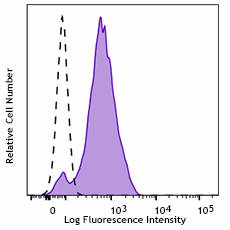
-

Human peripheral blood lymphocytes stained with CD49d (clone 9F10) Purified (filled histogram) or Purified Mouse IgG1, κ isotype control (open histogram) followed by anti-mouse IgG FITC.
| Cat # | Size | Price | Quantity Check Availability | Save | ||
|---|---|---|---|---|---|---|
| 304339 | 100 µg | £136 | ||||
| 304340 | 1 mg | £459 | ||||
CD49d is a 150 kD α integrin chain known as α4 integrin or VLA-4 α chain. It forms a heterodimer with either integrin β1 (α4β1, VLA-4) or β7 (α4β7). CD49d is expressed broadly on T lymphocytes, B lymphocytes, monocytes, thymocytes, eosinophils, basophils, mast cells, NK cells, dendritic cells, and some non-hematopoietic cells, but not on normal red blood cells, platelets or neutrophils. VLA-4 binds to VCAM-1 (CD106) and fibronectin. α4β7 is the receptor for VCAM-1 and MAdCAM-1. CD49d participates in mononuclear cell trafficking to endothelial sites of inflammation and has roles in cell-cell interactions and cell adhesion to extracellular matrices. CD49d is involved in lymphocyte migration, T cell activation, and hematopoietic stem cell differentiation. CD49d is a marker to isolate pure populations of Treg cells due to its absence on Foxp3+ cells.
Product DetailsProduct Details
- Verified Reactivity
- Human, Cynomolgus, Rhesus
- Reported Reactivity
- African Green, Baboon, Cat, Cow, Chimpanzee, Common Marmoset, Dog, Horse, Sheep, Squirrel Monkey
- Antibody Type
- Monoclonal
- Host Species
- Mouse
- Formulation
- 0.2 µm filtered in phosphate-buffered solution, pH 7.2, containing no preservative.
- Endotoxin Level
- Less than 0.01 EU/µg of the protein (< 0.001 ng/µg of the protein) as determined by the LAL test.
- Preparation
- The Ultra-LEAF™ (Low Endotoxin, Azide-Free) antibody was purified by affinity chromatography.
- Concentration
- The antibody is bottled at the concentration indicated on the vial, typically between 2 mg/mL and 3 mg/mL. Older lots may have also been bottled at 1 mg/mL. To obtain lot-specific concentration and expiration, please enter the lot number in our Certificate of Analysis online tool.
- Storage & Handling
- The antibody solution should be stored undiluted between 2°C and 8°C. This Ultra-LEAF™ solution contains no preservative; handle under aseptic conditions.
- Application
-
FC - Quality tested
IHC-F, Costim - Reported in the literature, not verified in house - Recommended Usage
-
Each lot of this antibody is quality control tested by immunofluorescent staining with flow cytometric analysis. For flow cytometric staining, the suggested use of this reagent is ≤ 0.125 µg per million cells in 100 µl volume or 100 µl of whole blood. It is recommended that the reagent be titrated for optimal performance for each application.
- Application Notes
-
Additional reported applications (for the relevant formats) include: immunohistochemical staining of acetone-fixed frozen tissue sections, and in vitro T cell costimulation2,3. The Ultra-LEAF™ Purified antibody (Endotoxin < 0.01 EU/µg, Azide-Free, 0.2 µm filtered) is recommended for functional assays (Cat. No. 304339 and 304340).
-
Application References
(PubMed link indicates BioLegend citation) -
- Schlossman S, et al. Eds. 1995. Leucocyte Typing V. Oxford University Press. New York.
- Jeong SH, et al. 2004. J. Virol. 78:6995. (Costim)
- Vogel TU, et al. 2002. J. Immunol. 169:4511. (Costim)
- Kleinewietfeld M, et al. 2009. Blood 113:827. (FC) PubMed
- Palacious F, et al. 2010. Blood 115:4488. PubMed
- Yoshino N, et al. 2000. Exp. Anim. (Tokyo) 49:97. (FC)
- Sestak K, et al. 2007. Vet. Immunol. Immunopathol. 119:21.
- Mattapallil MJ, et al. 2011. J. Immunol. 187:1977. PubMed
- Product Citations
-
- RRID
-
AB_2810443 (BioLegend Cat. No. 304339)
AB_2810444 (BioLegend Cat. No. 304340)
Antigen Details
- Structure
- Integrin, type I transmembrane glycoprotein, 150 kD.
- Distribution
-
T cells, B cells, NK , dendritic cells, thymocytes, monocytes, eosinophils, mast cells.
- Function
- Lymphocyte migration, T cell activation, stem cell differentiation.
- Ligand/Receptor
- Fibronectin, VCAM-1, MAdCAM-1
- Cell Type
- B cells, Dendritic cells, Eosinophils, Mast cells, Monocytes, NK cells, T cells, Thymocytes, Tregs
- Biology Area
- Cell Adhesion, Cell Biology, Immunology, Innate Immunity
- Molecular Family
- Adhesion Molecules, CD Molecules
- Antigen References
-
1. Elices M, Ed.1995. Springer Semin. Immunopathol. 16(4).
2. Lobb RR and Helmer ME. et al. 1994. J. Clin. Invest. 94:1722. - Gene ID
- 3676 View all products for this Gene ID
- UniProt
- View information about CD49d on UniProt.org
Related FAQs
- Do you guarantee that your antibodies are totally pathogen free?
-
BioLegend does not test for pathogens in-house aside from the GoInVivo™ product line. However, upon request, this can be tested on a custom basis with an outside, independent laboratory.
- Does BioLegend test each Ultra-LEAF™ antibody by functional assay?
-
No, BioLegend does not test Ultra-LEAF™ antibodies by functional assays unless otherwise indicated. Due to the possible complexities and variations of uses of biofunctional antibodies in different assays and because of the large product portfolio, BioLegend does not currently perform functional assays as a routine QC for the antibodies. However, we do provide references in which the antibodies were used for functional assays and we do perform QC to verify the specificity and quality of the antibody based on our strict specification criteria.
- Does BioLegend test each Ultra-LEAF™ antibody for potential pathogens?
-
No, BioLegend does not test for pathogens in-house unless otherwise indicated. However, we can recommend an outside vendor to perform this testing as needed.
- Have you tested this Ultra-LEAF™ antibody for in vivo or in vitro applications?
-
We don't test our antibodies for in vivo or in vitro applications unless otherwise indicated. Depending on the product, the TDS may describe literature supporting usage of a particular product for bioassay. It may be best to further consult the literature to find clone specific information.
Other Formats
View All CD49d Reagents Request Custom ConjugationCustomers Also Purchased
Compare Data Across All Formats
This data display is provided for general comparisons between formats.
Your actual data may vary due to variations in samples, target cells, instruments and their settings, staining conditions, and other factors.
If you need assistance with selecting the best format contact our expert technical support team.
-
APC anti-human CD49d
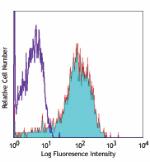
Human peripheral blood lymphocytes stained with 9F10 APC -
PE anti-human CD49d
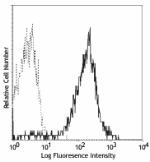
Human peripheral blood lymphocytes stained with 9F10 PE -
PE/Cyanine5 anti-human CD49d
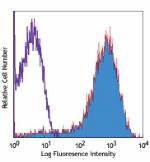
Human peripheral blood lymphocytes stained with 9F10 PE/Cyan... -
Purified anti-human CD49d
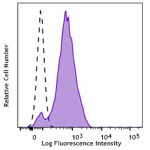
Human peripheral blood lymphocytes stained with CD49d (clone... -
Alexa Fluor® 594 anti-human CD49d
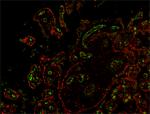
Human paraffin-embedded placenta tissue slice was stained wi... -
PerCP/Cyanine5.5 anti-human CD49d
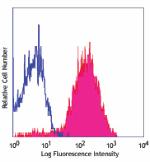
Human peripheral blood lymphocytes stained with 9F10 PerCP/C... -
PE/Cyanine7 anti-human CD49d
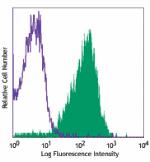
Human peripheral blood lymphocytes stained with 9F10 PE/Cyan... -
FITC anti-human CD49d
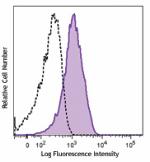
Human peripheral blood lymphocytes were stained with CD49d (... -
Brilliant Violet 510™ anti-human CD49d
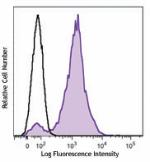
Human peripheral blood lymphocytes were stained with CD49d (... -
Brilliant Violet 421™ anti-human CD49d
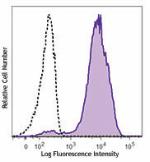
Human peripheral blood lymphocytes were stained with CD49d (... -
Purified anti-human CD49d (Maxpar® Ready)
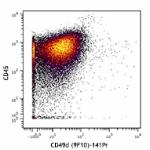
Human PBMCs stained with 154Sm-anti-CD45 (HI30) and 141Pr-an... -
Brilliant Violet 605™ anti-human CD49d
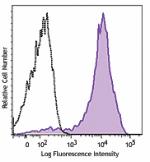
Human peripheral blood lymphocytes were stained with CD49d (... -
PE/Dazzle™ 594 anti-human CD49d
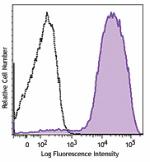
Human peripheral blood lymphocytes were stained with CD49d (... -
APC/Cyanine7 anti-human CD49d
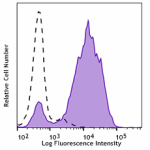
Human peripheral blood lymphocytes were stained with CD49d (... -
Brilliant Violet 711™ anti-human CD49d
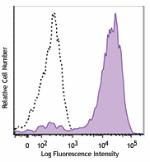
Human peripheral blood lymphocytes were stained with CD49d (... -
Alexa Fluor® 647 anti-human CD49d

Human peripheral blood lymphocytes were stained with CD49d (... -
Biotin anti-human CD49d
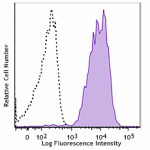
Human peripheral blood lymphocytes were stained with biotiny... -
TotalSeq™-A0576 anti-human CD49d
-
Brilliant Violet 785™ anti-human CD49d
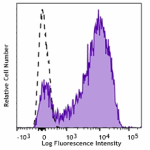
Human peripheral blood lymphocytes were stained with CD49d (... -
APC/Fire™ 750 anti-human CD49d
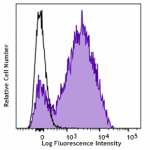
Human peripheral blood lymphocytes were stained with CD49d (... -
Ultra-LEAF™ Purified anti-human CD49d

Human peripheral blood lymphocytes stained with CD49d (clone... -
TotalSeq™-C0576 anti-human CD49d
-
TotalSeq™-B0576 anti-human CD49d Antibody
-
TotalSeq™-D0576 anti-human CD49d
-
APC/Fire™ 750 anti-human CD49d
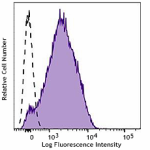
Typical results from human peripheral blood lymphocytes stai...
 Login / Register
Login / Register 







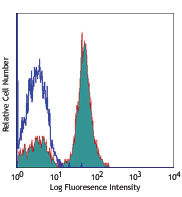
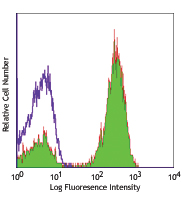




Follow Us